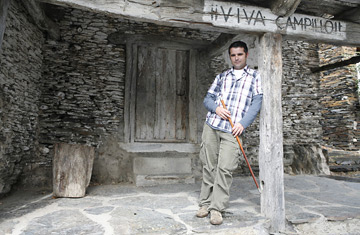
Francisco Maroto, major of Campillo de Ranas.
Local wags in Campillo de Ranas, a tiny village 78 miles (125 km) northeast of Madrid, like to say their mayor is in a race with the town priest to see who can marry more people. But in truth, Francisco Maroto, 43, has already beaten the cleric. In the past three years, he has married 78 couples, most of whom don't figure among the 210 residents. Of course, he has an advantage: thanks to Spain's 2005 law legalizing gay marriage, Maroto has a larger pool of candidates from which to draw. He also has a powerful motivation. Officiating at both gay and straight weddings, he believes, may save his town.
Until recently, Campillo badly needed saving, with Spain's falling rural population pushing it and many other small towns to economic despair. When the gay-marriage law was passed, Maroto saw an opportunity, deciding to turn his community into a sort of Iberian Las Vegas, albeit one with stacked-stone houses and black slate roofs.
"Some mayors were saying they wouldn't marry gays. I said I would," Maroto recounts. When Campillo's justice of the peace resigned in protest, Maroto, who took advantage of Spain's new law in 2005, turned the post over to his husband.
It's not just gay couples who have been drawn to Campillo. Of Maroto's 78 weddings, 55 have been between straight partners. "Couples don't want the cold atmosphere of a courthouse. Here, they know it will be personal," the mayor says. That it is: at a wedding with a Lord of the Rings theme, the mayor dressed as Gandalf.
The wedding industry has been just the tonic Maroto had hoped it would be, bringing new business to the town's inns and restaurants and making the area attractive to young couples—gay and straight—looking to settle away from the city. Last year Campillo had enough children to reopen its school, which had closed 30 years earlier. This year it got cell-phone coverage for the first time. Company towns may rise and fall with the fortunes of their main industry, but as long as there are weddings, there will be Campillo.